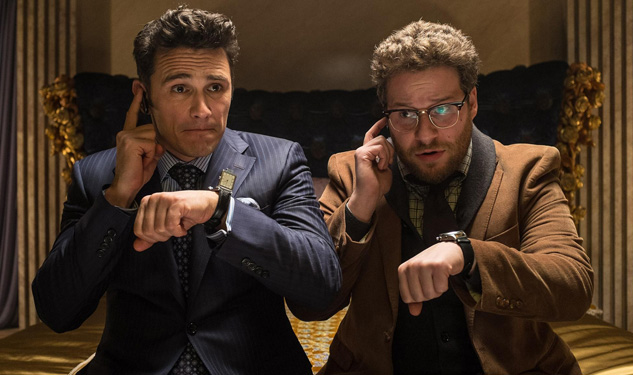
- Industry
The Interview Changes the Paradigm
Sony’s immensely controversial comedy about the assassination of North Korean leader Kim Jong-un, The Interview, hasn’t just sparked a crisis as the studio tries to cope with the airing of a great number of embarrassing little secrets. It hasn’t just enraged the world’s most volatile nuclear nation, and it hasn’t just led to the introduction of a new round of sanctions against the DPRK. It has also shown Hollywood that its decades old business model may need a major update.
With the country’s major cinema chains unwilling to screen the film after threats of “9-11 like” retaliation by the team of hackers that aired Sony’s dirty laundry, the studio was left scrambling to convince the country’s few remaining independent theaterowners to show its movie. Finding itself with hundreds rather than the normal thousands of available screens for The Interview, Sony took the unprecedented step of releasing a major production day and date on home entertainment platforms through YouTube Movies, Goggle Play, Vudu, Xbox Video, Sony’s own Seetheinterview.com and later ITunes.
On Christmas day, the American public got their chance to see Seth Rogen and James Franco carry out their farcical CIA-backed plot to assassinate the supreme leader of North Korea. Three hundred and eleven independent cinemas agreed to show the film. Fans lined up for sold out showings, some swelling with a sense of patriotism, others with the titillating fear that they might feel while being strapped into a roller coaster, as the curtains opened for the movie that Kim Jong-un didn’t want them to see. Another legion of viewers turned on their laptops and televisions, settled onto their couches, and pressed play. The Interview made just $2.8 million in its five-day opening theatrical run. Whereas the big-screen failed to produce a substantial return, the home display proved that it could facilitate major returns in what was its biggest test to date. A reported 2 million rentals and purchases were made through digital distribution services, generating an estimated $15 million in its first four days. On New Year’s Day, it became available also via pay-per-view and on-demand from major television providers including Comcast, Time Warner Cable, AT&T Uverse, and DirecTV.
While digital is showing its potential, the big screen is in some trouble. North American box office revenue and attendance were both down 5.2% in 2014 from the previous year, the biggest single year decline in over a decade, while home entertainment options have never been more plentiful. Services like Netflix and Hulu Plus that offer thousands of films to their subscribers, as well as the growing amount of increasingly high quality television programming, have eaten away at the silver screen’s substantial corner of the U.S. entertainment market.
That’s not to say that movie theaters are a thing of the past. In China, for instance, 1,105 new theaters were opened in the last year, and audiences are pouring in. Box office revenue in the middle kingdom reached a record $4.76 billion in 2014, up 36% from 2013. With sales lagging at home, Hollywood will look to the East for sustained growth in traditional box office income in the next decade even as it continues to retool its profit maximizing strategies.
The Interview’s is a very special case, with extraneous circumstances surrounding it in every direction. Even so, its day-and-date release on a variety of digital platforms produced enough income to give theater owners a fright and make studios rethink their distribution strategies. This time, given the choice between the magic of the theater and the comfort of their homes, viewers preferred to watch the film on their TVs, laptops, and Ipads, eschewing the night out for a simple night in.
Lorenzo Soria

